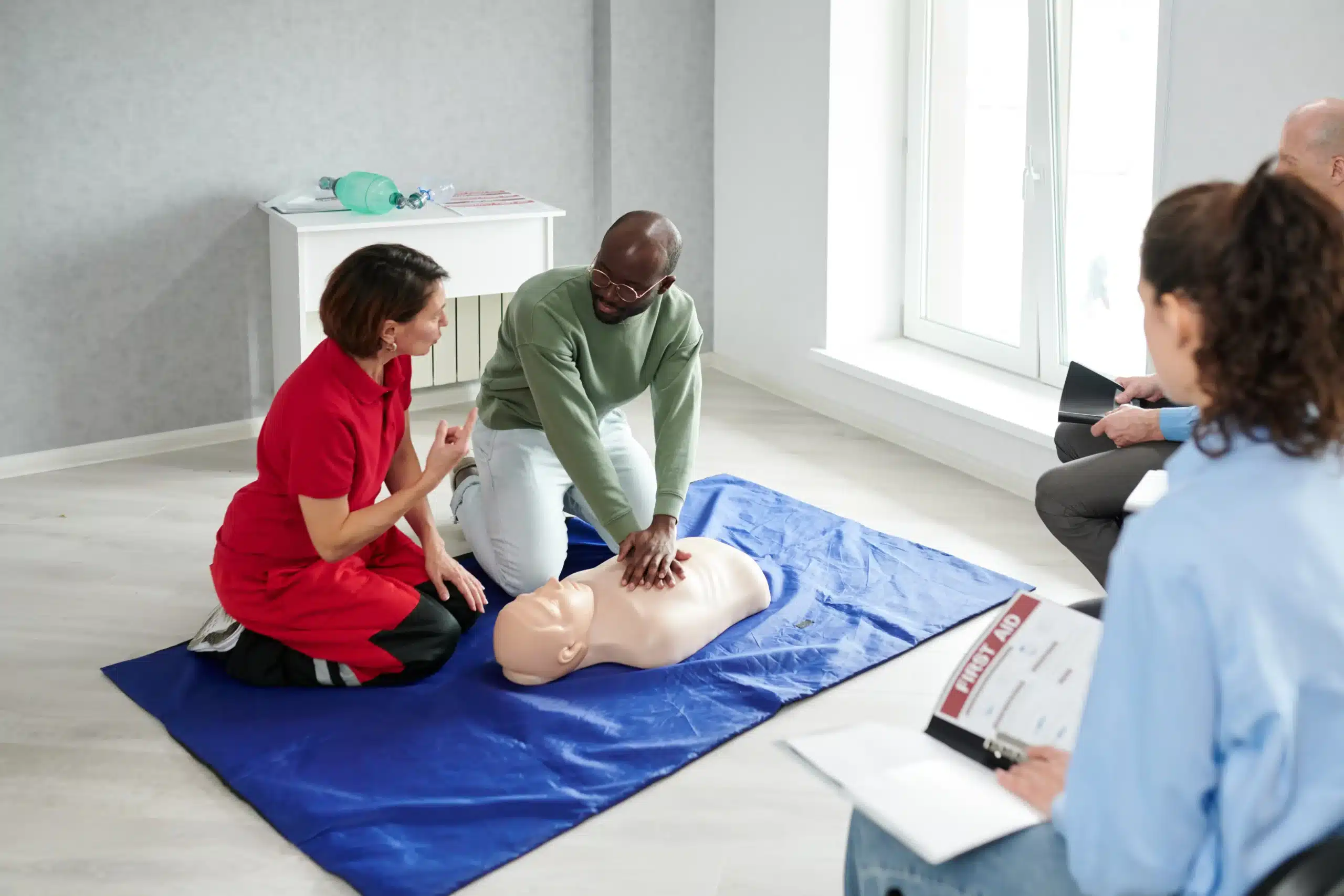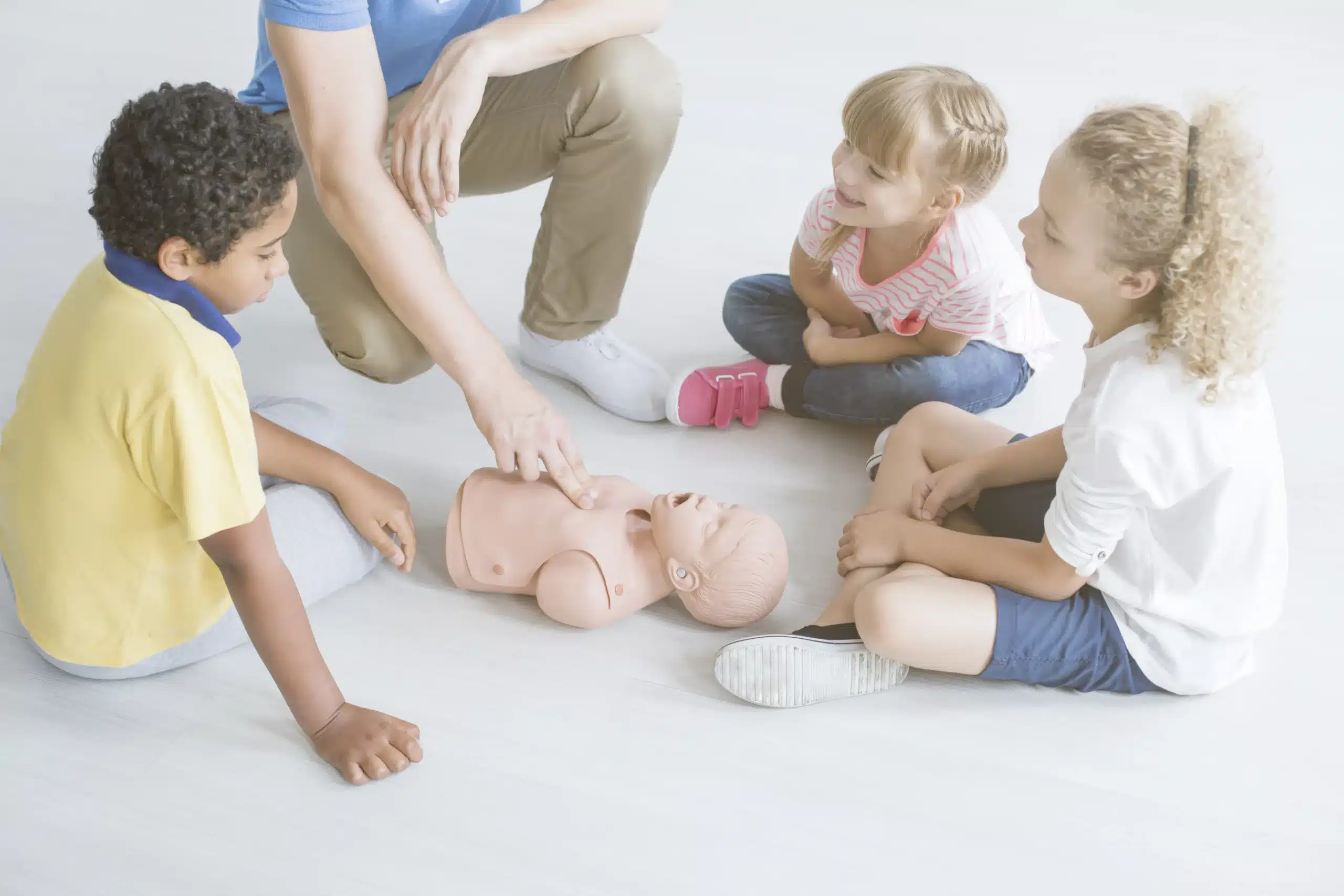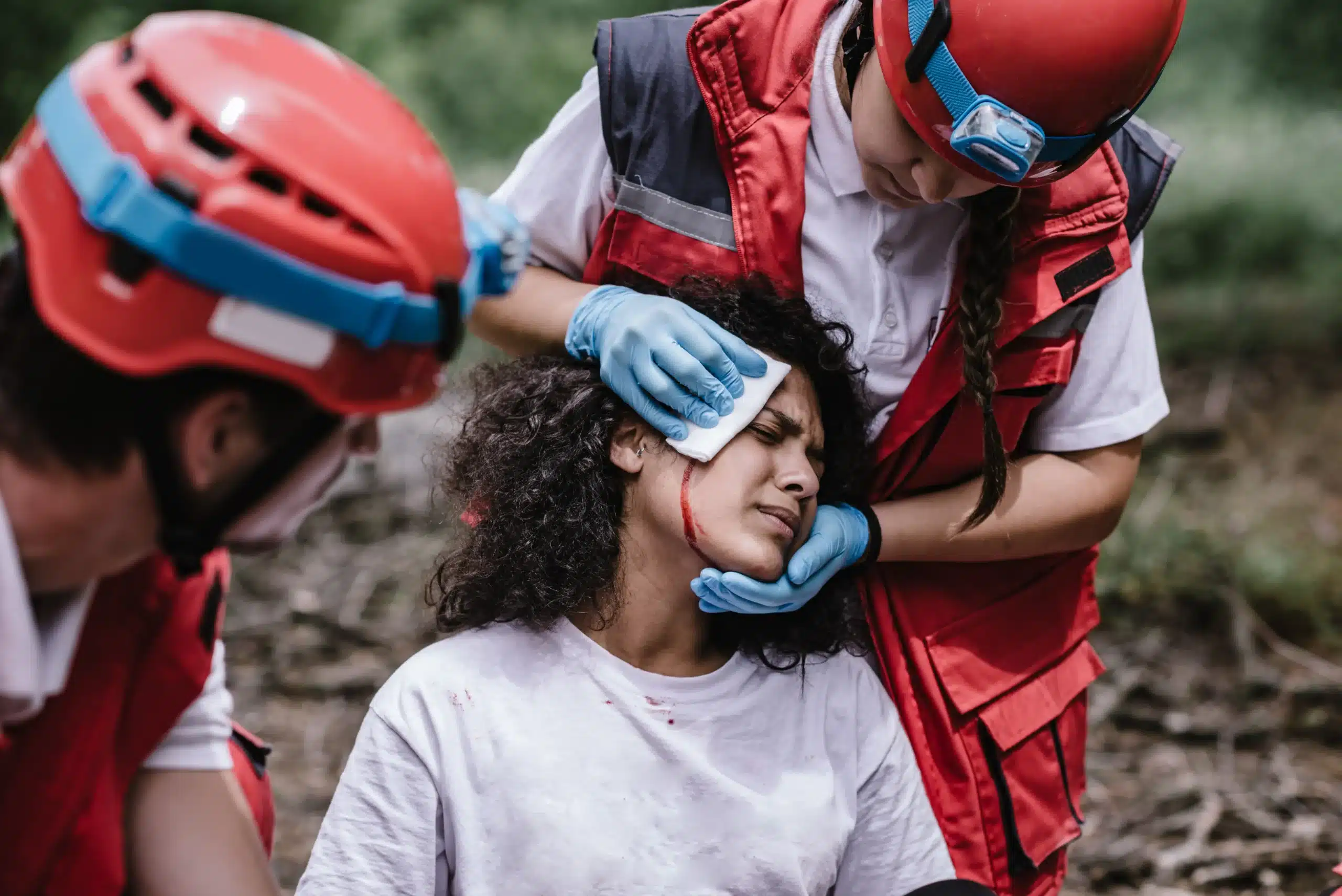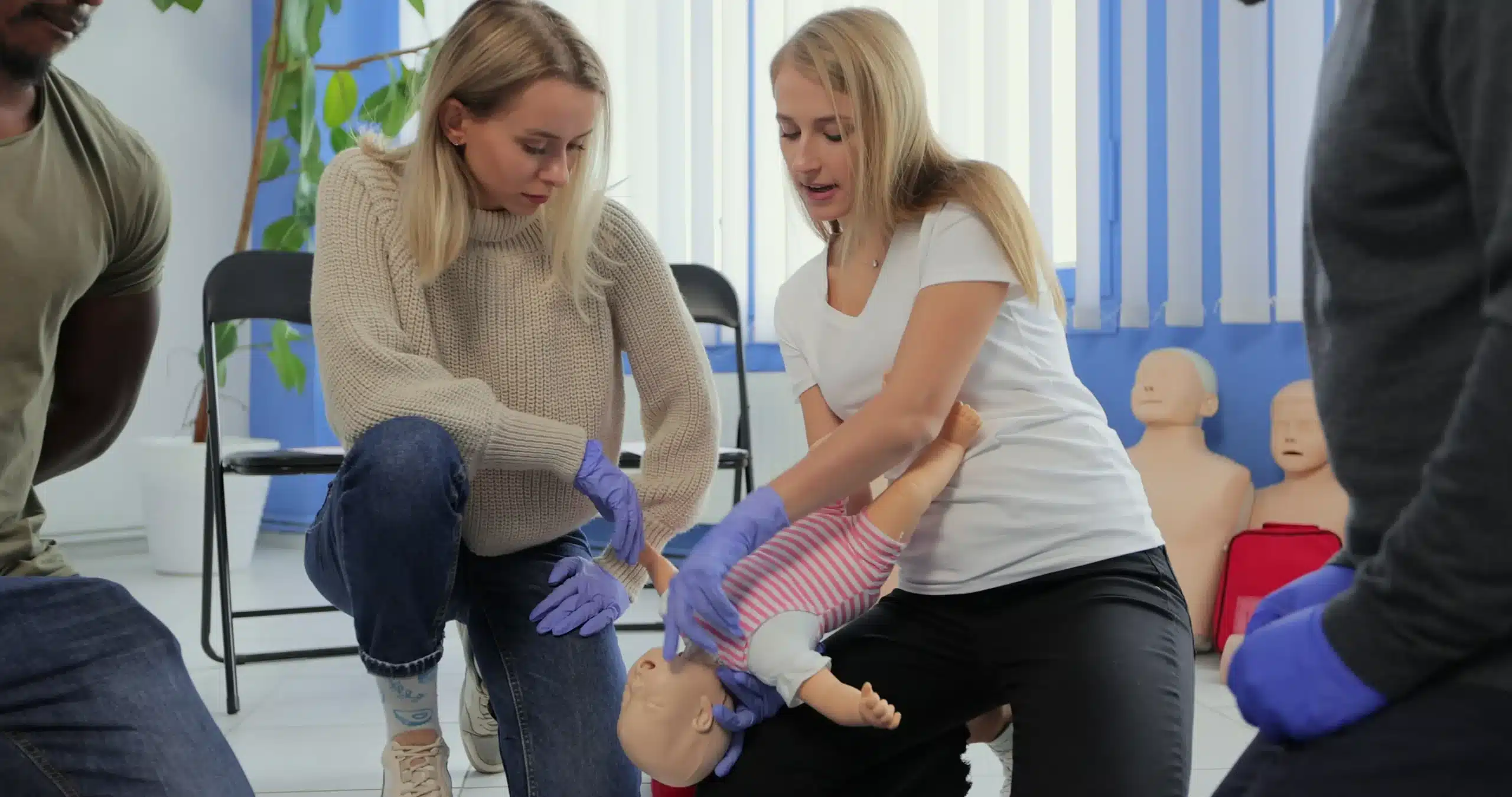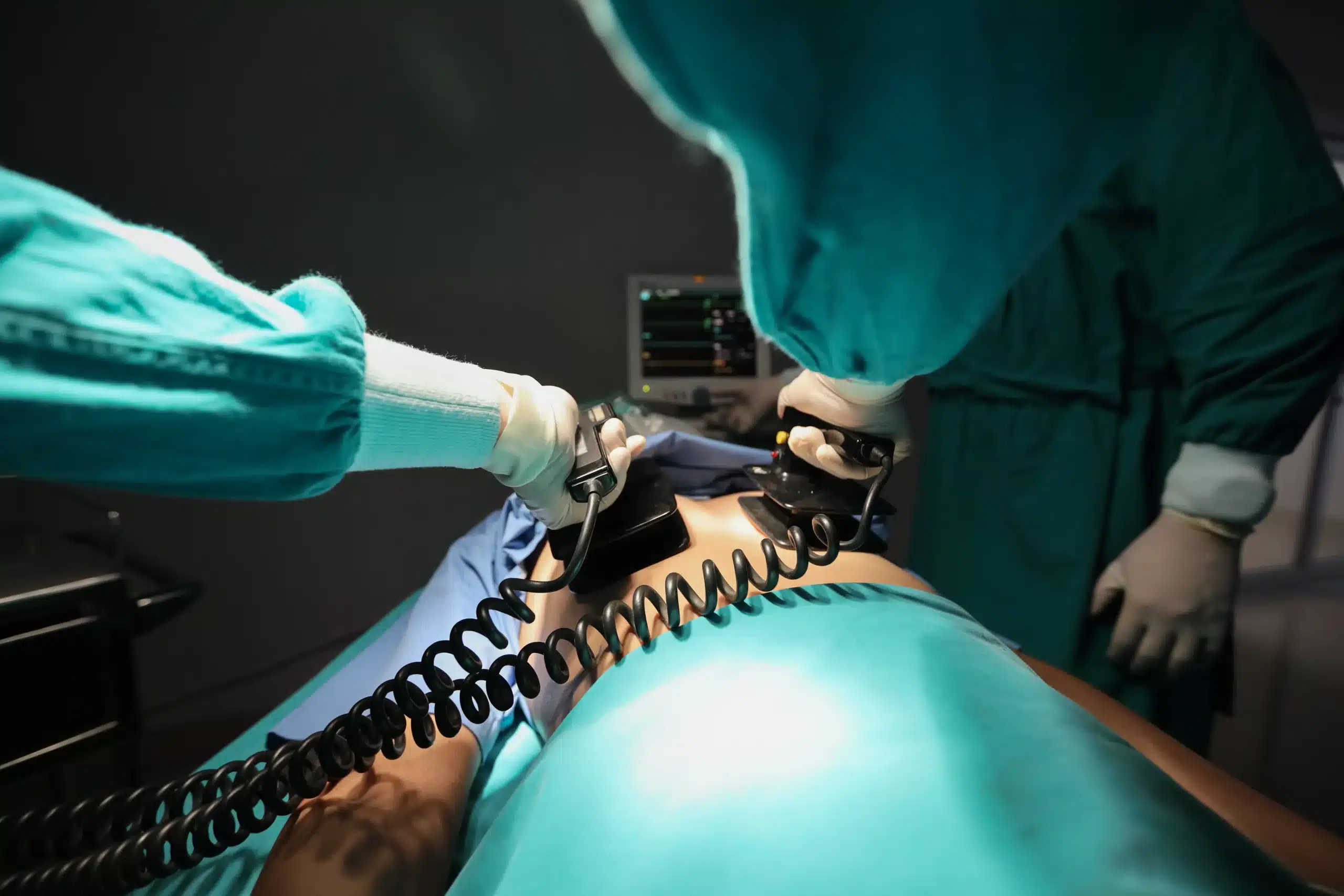Life can throw curveballs, and knowing how to respond effectively in a medical emergency can make all the difference. CPR renewal in Dublin is your key to maintaining those crucial life-saving skills. This comprehensive guide walks you through the process, from understanding why renewal is essential to finding the right course and provider for your needs. We’ll explore the various options available in Dublin, discuss the benefits of staying certified, and provide practical tips for maintaining your skills between renewals. Whether you’re a seasoned healthcare worker or just starting your CPR journey, this guide will equip you with the knowledge and resources you need to confidently handle any emergency.
Key Takeaways
- Regular CPR renewal keeps your skills sharp and ensures you’re prepared to act confidently in emergencies. It’s essential for staying current with the latest AHA guidelines and maintaining professional qualifications. Explore convenient options like the RQI program for quick recertification.
- Finding the right CPR renewal course involves considering your professional requirements, learning preferences, and schedule. Research providers like Safety Training Seminars, the American Red Cross, and the Irish Heart Foundation, comparing course formats, content, and scheduling options. Prioritize hands-on practice and certification recognition.
- Maintaining CPR proficiency is an ongoing process. Supplement your two-year certification renewal with regular practice, continuing education opportunities, and staying informed about the latest guidelines. This proactive approach ensures you’re always ready to provide effective care when it matters most.
What is CPR Renewal in Dublin?
CPR renewal in Dublin is how you recertify your CPR skills and knowledge before your current certification expires. Like driver’s licenses, CPR certifications have expiration dates. This ensures rescuers stay up-to-date with the latest guidelines and techniques. CPR renewal involves a refresher course and a practical exam demonstrating your skills. Safety Training Seminars offers a range of American Heart Association (AHA) certified courses, including CPR and First-Aid, to help maintain your certification. We serve Dublin, Livermore, and Mountain House, CA.
Why Renew Your CPR Certification?
CPR guidelines and best practices change as medical research advances. Renewing your certification ensures you’re equipped with the most current, life-saving techniques. Most organizations, including the AHA, require recertification every two years. This regular renewal helps maintain your skills and confidence in emergencies. Many workplaces and organizations require current CPR certification, making renewal essential for your professional qualifications. Our convenient RQI program offers a quick and efficient way to renew.
Benefits of Staying Certified
Staying current with your CPR certification has several key advantages. Primarily, it allows you to provide effective care in a medical emergency. Regular training reinforces best practices and builds muscle memory for quick, confident reactions under pressure. Maintaining your certification also shows your commitment to patient safety and high-quality care, valuable in many professional settings. Knowing you can potentially save a life brings peace of mind. We offer discount group classes for businesses and organizations looking to certify multiple people. Our low price guarantee ensures you’re getting the best value, and we also offer EMSA Child Care Health & Safety training for childcare providers.
Top CPR Renewal Courses in Dublin
Finding the right CPR renewal course can feel overwhelming, but several reputable organizations in the Dublin area offer excellent training. Here’s a rundown of some top choices to help you get started.
Safety Training Seminars
Safety Training Seminars, located in nearby Livermore, offers a comprehensive selection of American Heart Association (AHA) courses, including BLS, ACLS, PALS, CPR, and First Aid. They prioritize providing high-quality instruction and convenient scheduling, with classes available seven days a week. This flexibility makes them a practical option for busy professionals and individuals in Livermore, Dublin, and surrounding areas. You can explore their course offerings and schedule on their website. Their commitment to excellent customer service and competitive pricing makes them a stand-out choice. For those specifically looking for CPR and First-aid certification, you can find more information here.
American Red Cross
The American Red Cross is a nationally recognized and trusted provider of CPR renewal courses. They offer various certifications, including CPR and First Aid renewal, with several learning options to accommodate different schedules and preferences. You can find CPR renewal courses near you on their website, along with information on blended learning (online and in-person components) and other course formats.
Irish Heart Foundation
For those seeking a hands-on approach to CPR renewal, the Irish Heart Foundation offers the Heartsaver CPR AED course. This course utilizes a practical, video-based learning format, allowing participants to learn and practice simultaneously. Instructors provide personalized feedback and guidance, helping you refine your CPR technique using manikins. Check the Irish Heart Foundation website for course schedules and locations in Dublin. This course is an excellent option for those who learn best by doing.
Dublin CPR Classes
Dublin CPR Classes provides a variety of AHA-certified courses, including BLS, ACLS, PALS, and First Aid. They are dedicated to delivering affordable, high-quality training and are known for their responsive customer service team. For more information on their courses and scheduling, visit the Dublin CPR Classes website. They aim to make CPR renewal accessible and convenient for everyone in the Dublin area. If you’re interested in learning more about CPR renewal in Dublin specifically, check out this helpful guide.
CPR Renewal Process Explained
Knowing how to perform CPR can be the difference between life and death. But like any important skill, CPR requires regular refreshing to stay sharp and effective. This section breaks down the CPR renewal process, making it easy for you to maintain your lifesaving skills.
Renewal Prerequisites
CPR certification generally needs renewal every two years. This ensures your skills are current and aligned with the latest American Heart Association guidelines. Before signing up for a renewal course, check your current card’s expiration date. While some providers might offer some flexibility, it’s always best to plan and renew before your certification lapses. This way, you’re always prepared for any emergency. For those looking for convenient renewal options, consider exploring our RQI program.
Registration Steps
Registering for your CPR renewal course at Safety Training Seminars is straightforward. Visit our website to view the course schedule and choose a date and time that works for you. We offer a variety of class times to accommodate busy schedules. You can complete the entire registration process online, securing your spot quickly and easily. For businesses or groups, we also offer discount group classes.
Course Components and Duration
Many CPR renewal courses now use a blended learning format, combining online modules with in-person skills sessions. This approach offers flexibility and convenience. You can complete the online portion at your own pace, then attend a shorter in-person session to practice your skills and receive your updated certification. These in-person classes provide essential hands-on training and lead to a two-year certification that meets workplace safety standards (OSHA). Our RQI program is another convenient option for quick certification. It’s designed for healthcare professionals and offers a flexible, skills-based approach to CPR renewal.
Compare CPR Renewal Course Options
When it comes to renewing your CPR certification in Dublin, you have several options. Understanding the differences between providers, course formats, and course content will help you choose the best fit.
Certification Bodies and Recognition
Different organizations offer CPR certification, and their certifications hold varying degrees of recognition. The American Heart Association (AHA) is widely accepted, especially in healthcare settings. Safety Training Seminars in nearby Livermore offers a range of AHA courses, including BLS, ACLS, PALS, and First Aid. The American Red Cross is another well-known provider. Consider your workplace requirements when selecting a certifying body.
Course Formats (In-Person, Online, Blended)
CPR renewal courses come in various formats. In-person classes provide hands-on training and direct interaction with instructors. Online modules offer flexibility, allowing you to learn at your own pace. Blended learning combines both, often featuring online coursework with in-person skills sessions. Dublin CPR Classes offers in-person, online, and blended learning options.
Content Focus and Hands-On Practice
While all CPR renewal courses cover core life-saving techniques, the specific content and emphasis can differ. Some courses, like the Heartsaver CPR AED, use a practice-while-watching video format, offering guided instruction and feedback. Look for courses that include plenty of hands-on practice with manikins. This is essential for building muscle memory and confidence. San Ramon CPR Courses offers in-person BLS courses that meet AHA standards, emphasizing practical skills.
Flexible Scheduling
Finding time for CPR renewal can be tricky. Many courses offer flexible scheduling. Dublin CPR Classes offers classes daily. Safety Training Seminars also provides convenient scheduling, with classes seven days a week in Livermore and nearby cities. Consider your availability and choose a course that works for you.
CPR Renewal Course Costs
CPR renewal doesn’t have to break the bank. Understanding the factors that influence pricing can help you find a course that fits your budget.
Average Price Range
CPR renewal costs in Livermore, California, fluctuate based on several factors. The training provider, the type of certification (BLS, ACLS, PALS, or First Aid/CPR combo), and whether you opt for online or in-person training all play a role. Generally, basic CPR renewal is more affordable than advanced certifications like ACLS or PALS. In-person training, while offering valuable hands-on practice, often comes with a higher price tag than online or blended learning options. It’s always a good idea to compare prices from different providers, like Safety Training Seminars in Livermore, to find the best value. You can check out our low price guarantee for more information.
Additional Fees
Keep an eye out for potential extra costs. Some providers may charge additional fees for course materials, certification cards, or other services. Always confirm the total cost upfront to avoid any surprises. Costs vary depending on the provider and course type. Group discounts are often available, so if you’re renewing with colleagues or friends, be sure to ask! Safety Training Seminars offers discounts for group classes.
Group Discounts and Promotions
If you’re renewing your certification with a group, you might be eligible for a discount. Many providers, including Safety Training Seminars, offer discounted rates for group bookings. This can be a great way to save money, especially for workplaces or community organizations. Check with your chosen provider about their group discount policies. Also, keep an eye out for promotional offers or seasonal discounts that can further reduce the cost of your CPR renewal. Sometimes, bundling CPR renewal with other certifications, like First Aid, can also lead to cost savings. Contact us to learn more about our CPR and First-aid certification courses.
What to Expect During CPR Renewal
Renewing your CPR certification is straightforward, designed to refresh your skills and knowledge. Here’s what you can expect:
Classroom Instruction
CPR renewal courses typically start with a classroom review of essential concepts. Expect a refresher on recognizing cardiac arrest, the importance of early intervention, and performing high-quality CPR. Safety Training Seminars adheres to the American Heart Association (AHA) guidelines, ensuring your training is up-to-date. This portion also covers any guideline updates since your last certification and is a great time to ask questions.
Hands-On Practice and Simulations
Hands-on practice is at the heart of CPR renewal. You’ll use training manikins to practice chest compressions, rescue breaths, and using an AED. Instructors will guide you, offering feedback and helping you refine your technique. This builds muscle memory and confidence, preparing you for real emergencies. Many courses, like those from Irish Heart, use a “practice-while-watching” format so you can learn and apply skills simultaneously. This hands-on training is crucial for mastering the timing and coordination required for effective CPR.
Skills Assessment and Certification
After reviewing the material and practicing, you’ll complete a skills assessment to demonstrate proficiency. This usually involves performing CPR on a manikin in a simulated scenario. After successfully completing the test, you’ll receive your updated CPR certification card, valid for two years. CPR renewal courses meeting AHA standards equip you with the skills and confidence to respond effectively in emergencies. Your renewed certification means you’re prepared to provide critical care and potentially save a life.
Choose the Right CPR Renewal Course
Picking the right CPR renewal course is key to keeping your skills sharp and your certification current. Let’s break down how to find the perfect fit.
Your Professional Requirements
First, think about your job. Do you work in healthcare, childcare, or another field with specific requirements? Some professions require healthcare professionals to hold certifications from particular organizations like the American Heart Association. Your employer might also have specific renewal timelines. CPR certification needs regular renewal, typically every two years, to ensure your skills are up-to-date. Renewal involves completing a recognized training course and passing a skills test. Check with your workplace or professional organization to understand your requirements. Knowing these details upfront will save you time and ensure you choose a course that meets your needs.
Course Accessibility and Learning Preferences
Next, consider your learning style and schedule. Do you prefer in-person instruction or online learning? Many CPR renewal courses offer a variety of formats. Blended learning, which combines online modules with in-person skills sessions, is a popular option that offers flexibility. Think about what works best for you. If you thrive in a classroom setting, an in-person course might be a good choice. If your schedule is packed, an online or blended learning option could be more convenient. Dublin CPR Classes offers flexible training with a range of options. Consider factors like location, class times, and course length to find a course that fits your lifestyle.
Common Concerns and Questions
It’s normal to have questions about CPR renewal. One common concern is what happens if your certification lapses. While it’s always best to stay current, even with an expired certification, it’s better to attempt CPR than do nothing in an emergency. Another frequent question revolves around online certifications. While convenient, online CPR certifications may not meet all workplace requirements. For example, OSHA doesn’t recognize them. A physical course is generally recommended. If you’re unsure, it’s always a good idea to double-check with your employer or a certifying organization like the Red Cross to confirm what type of certification they require. Don’t hesitate to ask questions – getting clear answers will help you make an informed decision.
Maintain Your CPR Skills
CPR is a lifesaving skill, but like any skill, it gets rusty if you don’t use it. Staying current with your CPR certification isn’t just about checking a box; it’s about ensuring you’re prepared to act confidently and effectively in a real emergency. This section covers how to maintain your skills so you can provide the best possible care when every second counts.
Validity Period and Renewal Frequency
CPR certifications are typically valid for two years. This timeframe reflects the understanding that skills and knowledge can decline over time. Medical guidelines and best practices are constantly evolving. Regular renewal ensures you’re up-to-date on the latest recommendations from organizations like the American Heart Association. A two-year cycle provides a good balance between maintaining proficiency and staying abreast of advancements in resuscitation techniques. Don’t let your skills lapse; mark your calendar and plan for your CPR renewal in advance.
Continuing Education Options
Even with a current certification, there are ways to keep your skills sharp. Many CPR training providers offer refresher courses or continuing education opportunities. These can include online modules, in-person skills sessions, or a blended learning approach combining both. Blended learning is a great way to review the knowledge portion at your own pace and then practice with a certified instructor. Look for programs that align with your learning style and schedule. Safety Training Seminars offers a variety of AHA courses like BLS, ACLS, PALS, and First Aid to help you stay at the top of your game.
Importance of Regular Practice
Regular practice is key to maintaining muscle memory and confidence in your CPR skills. Even if you’ve recently renewed your certification, don’t let those skills get rusty. Take opportunities to review the procedures and practice the techniques. You can practice on a CPR manikin or visualize the steps mentally. Consider a local CPR study group or refresher workshops. Consistent practice, even in short bursts, can make a huge difference in your ability to recall and perform CPR effectively in a real-life emergency. Regular practice is the best way to ensure you’re truly prepared.
Related Articles
- Find CPR Classes in Dublin: Your Complete Guide – Livermore CPR Classes
- BLS Renewal in Dublin: A Simple Guide – Livermore CPR Classes
- CPR Certification in Dublin: Your Guide – Livermore CPR Classes
- Why CPR is Essential in Healthcare (and How to Get Certified)
- American Heart Association Courses – Livermore CPR Classes
Frequently Asked Questions
How often do I need to renew my CPR certification? CPR certifications are typically valid for two years. It’s best to renew before your current certification expires to ensure you’re always prepared for emergencies.
What are the different types of CPR renewal courses available? You can find in-person classes, online modules, and blended learning options (a mix of online and in-person). In-person training offers hands-on practice with instructors, while online courses provide more flexibility. Blended learning combines the benefits of both.
How much does CPR renewal cost? The cost varies depending on the training provider, the type of certification (like BLS, ACLS, or PALS), and the course format. Group discounts and promotions are often available, so it’s worth inquiring about those. Always confirm the total cost upfront, including any additional fees for materials or certification cards.
What if my CPR certification has already expired? While it’s always best to renew on time, having an expired certification is better than no certification. Even with lapsed certification, attempt CPR in an emergency – it’s better than doing nothing. Renew your certification as soon as possible.
Which CPR certification is best for my career? The best certification depends on your specific professional requirements. Some industries or employers require certification from specific organizations like the American Heart Association. Check with your employer or professional organization to determine which certification you need.

